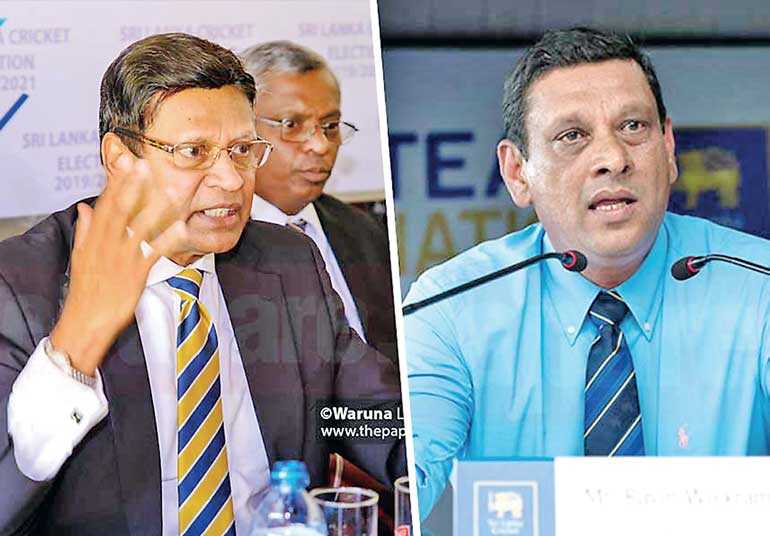Tuesday Feb 24, 2026
Tuesday Feb 24, 2026
Tuesday, 12 February 2019 00:00 - - {{hitsCtrl.values.hits}}

By Madushka Balasuriya
Mohan De Silva and Ravin Wickramaratne yesterday laid out what would be the foundation of their soon-to-be enforced legal challenge against their disqualification from Sri Lanka Cricket’s elections, while also unwittingly highlighting the unfulfilled promises of the past governments in terms of clearing up corruption at Sri Lanka Cricket.
Calling a media briefing, the pair, sitting alongside Shammi Silva, who is now the SLC presidential candidate from their camp, took issue with the interpretation of Sports Law clause 32, which was cited in order to rule them out of the running.
The clause refers to the “refusal, suspension and cancellation of registrations of National Associations of Sports”. The point of contention arises from a 2016 amendment to the Act, which ensured that any previous office bearer of a national sports body which had violated clause 32 of the Sports Act could not contest in any future elections.
De Silva and Wickramaratne are said to have infringed this clause, twice and once, respectively. In 2001, an SLC Executive Committee headed by Vijaya Malalasekera, which De Silva was a part of, was removed from office after they were found not to have properly notified the membership of an Annual General Meeting. In 2005, an Executive Committee, this time headed by De Silva and including Wickramaratne, was removed after the then-Sports Minister found the Board had incurred severe losses due to mismanagement.
The pair however contest that subsequent challenges in court against the Gazette notifications in 2001 and 2005, which ended in settlements, means that their original removal should not be considered valid. Indeed, this was the view taken by the independent Election Committee elected to oversee nominations. However, a Sports Ministry-appointed Advisory Committee looking into election-related appeals has now overturned that ruling.
“We came to know about this only through the media, and up to now we have not been officially intimated about this decision,” noted De Silva, who went on to dispute some of the finer details of the ruling in 2005, utilising a sheet of paper which highlighted alternating profit and loss years from 2000 to 2004.
“With regard to the loss incurred, I would say 2004 was one of the most successful periods that we had in the history of SLC. This paper very clearly shows it is not unusual for SLC to incur a loss during a financial year and then come up with a surplus in the next year, it’s a cycle.
“These were documents submitted to the media in 2005. These were all done to bring in those with malicious intent, the favourites of those in power at the time, I will openly say Mr. Jeevan Kumaratunga.
“And in another document you will see a report conducted by a three-member panel about a television deal. Now I signed a contract for $51 million in February for three years from 2005 - 2008. What did Mr. [Jayantha] Dharmadasa come and do? In six months he renegotiated the contract, and brought it down by 20 million dollars, extended the period by another three years, and entertained two addendums totally flouting all established procedures in going to the international market for tenders.”
With De Silva and Wickramaratne set to take the matter to court, there is a possibility that the upcoming 21 February elections will be postponed once more.
Old skeletons
During the course of the hour-long media briefing, several photocopied sheets of paper were passed along. Among those was a comprehensive report, compiled by an independent three-member committee, into allegations of corruption at Sri Lanka Cricket for the period January 2012 - April 2015.
While the report revisited several issues already available in the public domain, such as the allegations of corruption and conflict of interest against Nishantha Ranatunga (also running for office in the present elections), or the numerous allegations of misappropriated funds in the running and construction of various national cricket stadiums, what was glaring was the lack of further scrutiny into these allegations since the publication of the report.
Among the report’s recommendations was a Cabinet-mandated change to the SLC constitution so as to address the bloated SLC electoral process. “147 votes among 86 stakeholders is unwieldy considering the volume and geographical magnitude of cricket in Sri Lanka,” it read.
SLC voter distribution has long been a talking point due to the perceived control of dozens of votes by a handful of individuals.
Further it also referred to “around a dozen SLC employees,” who hold “key positions or are very closely connected with a stakeholder”. This, the report concluded, would result in a situation where “it would be difficult to resist the temptation of loyalty to the stakeholder and could give rise to a conflict of interest.”
While several other time-sensitive recommendations were made, the above two standout in that they have not yet been addressed and are of particularly pressing concern to Sri Lanka Cricket’s present malaise.